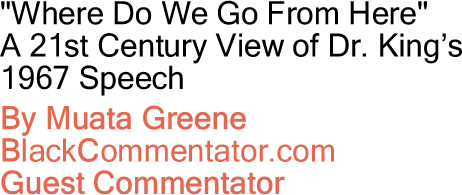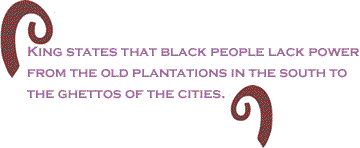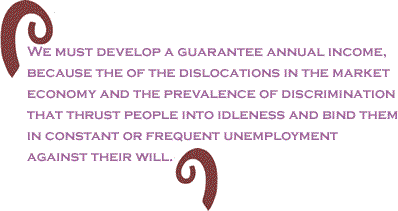
|
|||||||||||||||||||||||

|
|

Custom Search
|
|
 |
|
I would like to look at Martin Luther King Jr’s speech he gave 42 years ago Title: Where do we go from here? There are many parallels and broader understandings to look at. Let’s look at the time and context he spoke, it was August 16, 1967 at the 10th anniversary convention Of the S.C.L.C. Southern Christian Leadership Conference in Atlanta, Georgia. The Poor People’s March on Washington had not happened. He started by giving a analysis of “Where we are now” by quoting the constitution which had a formula to determine taxes and representation by declaring that a black person was 60% of a person, and that the current formula was 50% of a person because of the substandard housing, half income of whites, twice the unemployment and double rate of infant mortality. Next he talked about “Depiction of Blackness and its contributions” He scholarly referred to the Roget’s Thesaurus and synonyms for blackness where at least 60 of them offensive and on the other side synonyms for white are all positive. Ossie Davis had once stated that The English language needs reconstruction so that black children wouldn’t learn to despise themselves. King goes on to state that as long as the black mind is enslaved; the body can never be free. Black People could only be free when we reach down deep to the inner depths of our being, and struggle with the double consciousness that W.E. Dubois talks about, and Frantz Fanon writes about “Black Skin White Mask”. “Basic Challenge” is to discover how to organize our strength in terms of economic and political power. King states that black people lack power from the old plantations in the south to the ghettos of the cities. “Now power properly understood is nothing but the ability to achieve purpose”. MLK
King refers to Walter Reuter a labor leader who said “Power is the
ability of a labor union like United Automobile Workers, to make
the most powerful corporation in the world like General Motors to
say Yes when it wants to say No. “Developing a Program” King states
that we
The dignity of the individual will flourish when the decisions of his life are in his own hands. Personal conflicts among husbands, wives and children will diminish when measurement of human worth on the scale of dollars is eliminated. I couldn’t agree more that the system of capital causes some of the major conflicts between people. Kings “Commitment to Nonviolence” where he reaffirms his commitment to nonviolence and the futility of violence in the struggle for racial justice. At best the riots have produced a little additional antipoverty money allotted by frightened government officials, and a few water-sprinklers to cool the children of the ghettos. It is like improving the food in the prison while the people remain securely incarcerated behind bars. The talk of overthrowing the racist state and local government, no internal revolution has ever succeeded by violence unless the government had already lost the allegiance and effective control of its armed forces. Castro was able to overthrown the Batista regime because he had sympathy of the vast majority of Cuban people. King also gives his view of “About Communism” I’m saying to you this morning is that Communism forgets that life is individual. Capitalism forgets that Life is social, and that the Kingdom of Brotherhood is found neither in the thesis of Communism nor the Antithesis of capitalism but in a higher synthesis. This clearly shows his religious background and analysis. In Conclusion: The above historical speech by one our greatest leaders can be applied to the 21st century, I am about reviewing the past and present in order to give an expanded view on what we think we know as a people and country. An as King quoted William Cullen Bryant who was right when he said “Truth crushed to earth will rise again” [References:
www.indiana.edu, A
Call to Conscience: The Landmark Speeches of Dr. Martin Luther King,
Jr. BlackCommentator.com Guest Commentator, Muata Greene, Click here to contact Mr. Greene. |
|
Any BlackCommentator.com article may be re-printed so long as it is re-printed in its entirety and full credit given to the author and www.BlackCommentator.com. If the re-print is on the Internet we additionally request a link back to the original piece on our Website. Your comments are always welcome. eMail re-print notice
If you send us an eMail message we may publish all or part of it, unless you tell us it is not for publication. You may also request that we withhold your name. Thank you very much for your readership. |
|
| |
|
| April 30 , 2009 Issue 322 |
|
| Executive Editor: Bill Fletcher, Jr. |
| Managing Editor: Nancy Littlefield |
| Publisher: Peter Gamble |
| Est. April 5, 2002 |
Printer Friendly Version
in resizeable plain
text format or pdf
format. |
| Frequently Asked Questions |
 |

|
 |
 |
 |
| |
| |




































